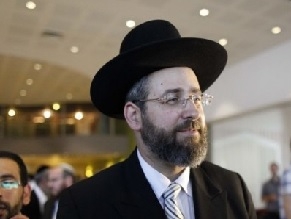|
World Jewish News

Rabbi David Lau at the elections for the two Chief Rabbis in Leonardo hotel in Jerusalem, July 24, 2013. (photo credit: Flash90/Yonatan Sindel)
|
Yitzhak Yosef, David Lau win chief rabbi posts
24.07.2013, Israel Two sons of former chief rabbis were chosen to be chief rabbis of Israel on Wednesday night, ending months of speculation.
Yitzhak Yosef, the son of Shas spiritual leader Ovadia Yosef, was chosen as the next Sephardi chief rabbi, and Rabbi David Lau, the son of former chief rabbi Yisrael Meir Lau, was picked as the head of the Ashkenazi rabbinate.
Both candidates are seen as mainstream figures unlikely to rock the boat of the rabbinate or the Knesset. Lau beat out Rabbi David Stav, a professed free thinker with goals of pushing Israel’s rabbinate straight into the 21st century and Yosef won against Rabbi Shmuel Eliyahu, a hardliner supported by the national religious.
The chief rabbi was selected in a complex and opaque process by a committee made up of 150 rabbis, mayors, religious functionaries, and government appointees.
Lau’s black hat and legacy connections to ultra-Orthodox rabbis made him a more traditional choice than the knitted-kipa wearing Stav.
His father, Rabbi Yisrael Meir Lau, was known for his ability to connect with both Haredi Jews and the Modern Orthodox.
Lau thanked his father, who stood beside him during a Channel 10 interview, for the educational upbringing that contributed to his victory. He vowed to make the chief rabbinate a more “welcoming” institution, but refrained from specifying what reforms he would enact. When asked whether he would take steps to ease the conversion or marriage processes in Israel, he responded that under his leadership the religious authority would be “appropriate” and “continue tradition.”
The junior Lau, who is currently the chief rabbi of the religiously diverse city of Modiin, pledged the same sort of inclusiveness as his father. Stav, meanwhile, the current chief rabbi of Shoham, had been touted as a modern thinker who could bring about desperately needed change in the rabbinate.
“I represent all kinds of groups, and he represents only a group of the national-religious, this is the difference,” Lau told The New York Times on Sunday in a rare interview. “You need to think about a rabbi who can speak with the other rabbis, not fight with them. To speak is better than to fight, I think.”
On the Sephardi side, the win by Yosef will be seen as a boost for the Shas party. Yosef also beat rabbis Ratzon Arusi, considered a long shot, and Tzion Shalom Boaron, who had the support of current Chief Rabbi Shlomo Amar.
He scraped onto the official list thanks only to an eleventh-hour ruling by the Council of the Chief Rabbinate that extended his authorization to serve as a municipal rabbi, a shingle which all candidates must carry.
Yosef will replace Amar, who did his best, but failed, to finagle a new law that would have allowed him to stay on beyond his term’s 10-year limit.
Yosef’s challenger, Eliyahu, had his candidacy okayed Monday by the Supreme Court following a challenge by Meretz MK Isawi Frej, who submitted a petition claiming the rabbi had incited violence against Arabs and made racist comments in the past. The court said there was not enough time to consider the allegations.
Yosef won with 68 votes, Eliyahu got 49 votes and Boaron got 28.
On the Ashkenazi side, Lau garnered 68 votes, while Stav got 54 and Rabbi Yaakov Shapira 25.
Shapira was the dark horse to fill the Ashkenazi seat unceremoniously vacated by former Ashkenazi Chief Rabbi Yona Metzger, who stepped down last month in the wake of a massive fraud investigation.
Metzger, who has been accused of pocketing unspecified amounts of donor cash earmarked for NGOs, denies the allegations but nevertheless chose to take his exit early.
A fourth candidate, Rabbi Eliezer Igra, bowed out of the race after realizing his chances of winning were too slim.
Rabbi David Stav, co-founder and the chairman of the Tzohar Rabbinical Organization. (photo credit: Flash 90/file)
Stav is the co-founder and chairman of Tzohar, an organization committed to helping couples maneuver the ultra-Orthodox rabbinate’s complicated maze of requirements on the path to religious marriage. He serves as the spiritual leader of Ma’aleh, a Jerusalem film school with a religious bent, and his contemporary, moderate take on Jewish life has led to a vicious backlash from more conservative sectors of society. A group of youths attacked him at a wedding in June, and that same month Shas spiritual leader Yosef labeled him “wicked” and “dangerous to Judaism.”
While Stav had been embraced by many Israelis weary of the ultra-Orthodox’s strict, iron-clad grip on Judaism, Lau said that his opponent’s platform of change was not something that should be supported.
By Debra Kamin and Joshua Davidovich
The Times of Israel
|
|
